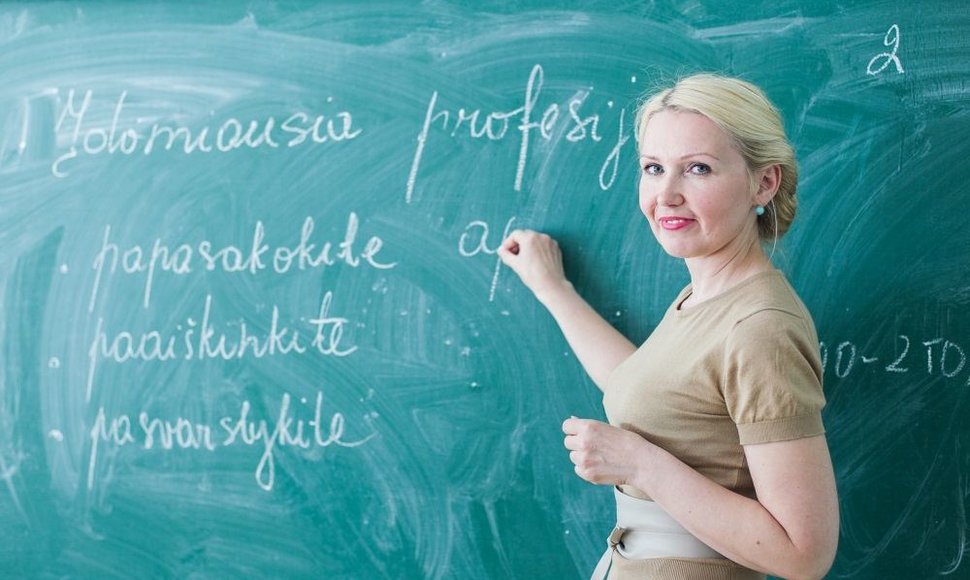Speaking to 15min several days before the examination, Vilma Tamošaitienė, who teaches Lithuanian language and literature classes to Polish-speaking students at the John Paul II Gymnasium in Vilnius, did not hide the fact that two years, given to national minority schools to prepare their students for language examination on par with native-speakers, is too short a period of time. In her opinion, the current examination is aimed at skilled students, while there are, nonetheless, numerous graduates with average capabilities.
– The final school bell have sounded and the Lithuanian language and literature examination awaits on Monday. What kind of mood are you in, seeing another generation of graduates leaving their school desks?
– Some fretfulness still remains, which is to be expected, when talking about students, who are starting a new stage of their lives. They will need to choose a profession, pick where to study, keeping in mind that financial matters should not be forgotten. Kids often tell me that they need higher grades, a chance to improve them, because they‘re aiming for state-financed university spots. This is natural, though I don‘t think it‘s only the pupils‘ wish to save money, since not everyone‘s parents are capable of paying tuition.
What worries me is that we have boarded the passing metaphorical train far too quickly. Two years isn’t the timeframe that allows any student to fully comprehend the entirety of the literature course, which, to be honest, is quite extensive.
The big fear this year, 2013, is how we can financially support our children and how many of them will be staying to study in Lithuania. From our school, 18 out of 127 graduates went abroad in 2012, while this year 13 out of 111 already have scholarships in Poland. Last year, out of 18 students, only 9 went ahead to study in Poland, meaning the rest chose to go elsewhere. Thus, it’s expected that there will be a higher number of those heading abroad in 2013.
– Another issue is the change in the Lithuanian language and literature examination. There have been ample discussions about the homogenization of the examination for native speakers and non-Lithuanian-speaking students this year. How do you evaluate the changes that await your students during the assessment?
– The current examination is oriented towards more skilled students. Perhaps that is what’s needed, perhaps there are underlying political and economic currents; however, what about those, who don’t necessarily want to aim for higher education, but would enjoy more appealing possibilities in the sphere of vocational training?
What worries me is that we have boarded the passing metaphorical train far too quickly. Two years isn’t the timeframe that allows any student to fully comprehend the entirety of the literature course, which, to be honest, is quite extensive. The programme itself is difficult for those who speak Lithuanian from the moment they’re born, which is a topic I discuss with other Lithuanian language teachers, who work with native speakers.
The amount of literature to master is huge and it’s unrealistic to suggest understanding it thoroughly. What I see in a negative light is that a student is supposed to be able to comprehend an entire literature course over two years, when the course is taught in Lithuanian schools from the fifth grade or as early as the first years of school. I’m unsure if I should view it as a revolution that demands blood, because this kind of a revolution does require a sacrifice. In that case, we can view those children as sacrificial lambs of sorts.
Though I do not consider myself competent enough to criticize the wishes of the politicians and the actions they have taken. As a teacher, I view the whole idea as a far too hasty plunge into cold water. This kind of exam is aimed at the skilled and there aren’t all that many of them in Lithuania. This means that we’re giving more possibilities to a capable minority and forgetting those of average abilities, though they are the majority.
Evaluating the situation in Lithuania as a whole, the following is true for us: we act first and we think second. In this particular case, it was a quick invasion that might result in casualties and bitter consequences. If that’s the aim, then we’re sure to achieve it.
– What kind of provisional timeframe and what type of changes to the curricula and textbooks are needed to prevent difficulties for ethnic minority students, when they take the homogenized Lithuanian language and literature examination?
– The problem is that even current ninth-graders are studying according to the old curricula. This means that we only have two final years. I think that the process should be gradual from the very first year at school. Just like you can’t climb right to the top of the stairs: you need to climb one step at a time and continue on to reach the top. It has to be a very gradual climb, one that isn’t painful for those who are not all that good at studying in general. Every student has the right to education, so everyone should have access to knowledge they can absorb slowly, over a period of time. There’s no question about it: knowledge must be attained.
Fair competition with Lithuanian schools would be the result. I believe everyone is fully aware of this, but they’re dedicated to making things as they see them in their mind. I can understand the government’s perspective that everything’s done in the manner that seem correct, while ignoring those with a lesser presence and, maybe even lesser skills. We’re mere cogs in the machine. Something like that is talked about in the school teachers' newspaper “Dialogas” (“Dialogue”), but talks are all they are.
Teachers are faced with the difficult task of quickly learning that which is required for the examination. Examinations need to be understood in terms of being moulds. You need to be able to write to fit the mould about things that are essentially creative, things that can be experienced, felt; literature isn’t mathematics: there is no correct answer. What’s needed is for you to wonder and ponder for a bit. There are many students who require help with this and it is impossible to help them in only two years’ time.
– Do you think that changes made to the exam tasks – students now can choose from seven studied authors (previous tasks only gave a choice of three) in answering a reasoning and literary essay question – will actually help them? Some teachers fear that after this change, students might find it harder to understand what’s required of them.
– Mathematically speaking, it would appear that there’s more choice. From the experience of my children, I can tell you that they’re glad to have more choices available to them. However, just like any other exam, this one’s not perfect; children understand that they can use any author with any question and get away with it. This helps better students.
Once again I’m reminded of how this two-year change in the curriculum is aimed at better-skilled students. Another question is whether everything would be better if you could choose among ten different authors; maybe that would make picking a question to answer too difficult. It's the same dilemma one encounters at any shop: the bigger the choice, the harder it is to decide. I can’t say for certain which way is better or worse. Some exam takers might see it as a benefit, while others might find it confusing.
– Is it challenging for ethnic minority school graduates to write a 400-word essay?
– When it had been decided to ask 500-600 word essays, it was clearly too much. If you haven’t mastered the Lithuanian language, penning 500 words isn’t easy, since it requires reasoning skills and the ability to argue, not simply relying on superficial and descriptive writing; not every child’s experience allows them to think, reflect and make adequate conclusions. Thus, I would say that the 400 word limit is acceptable: it isn’t too much and it isn’t too little.
Standardized marking is a problem: a statement, arguments, counter-arguments, context, and literary references are compulsory. Keeping this formula in their minds, pupils are afraid of making mistakes and of expressing original thought. This might form obstacles for a creative person, since they are forced into a specific frame of expectations. The question arises: what kind of personalities we want to nurture; do we prioritize knowledge or ability to apply it in real life?
The 400-word stipulation is great news for us, since we only have a couple of years to give students the necessary knowledge. But are we teaching them to love literature, or are we destroying their interest in it?
– You held mock examinations. What conclusions did you make afterwards and what flaws did you notice?
– The mock examinations demonstrated that students don’t have a sufficient vocabulary, their lexical abilities are poor. This is a direct result of non-Lithuanian-speaking pupils having too few Lithuanian classes; they only have about 4-5 classes per week. That is too few to allow a child to take in and understand even the core meanings of words.
Because of their limited vocabulary, kids resort to cunning: they transform a single sentence into several. There are also flaws in contextual knowledge. Evaluating and relying on context. I see that my pupils have not tapped their potential. Though I agree that it can be done, two years are not enough. Kids with mathematical inclinations will notice that supporting your essay argument with contextual points will give them merely three extra points out of fifty – and they might decide that it’s not worth the trouble; they might come to believe that reading the book in question and knowing how to illustrate statements and arguments with literary references is enough.
If you wrong minority students with one hand, you should help them a little with the other.
What should be celebrated is the ability of students with a holistic mindset to apply their knowledge of history and their native language. This should also be taught.
– Did you have to spend extra time teaching Lithuanian to high school graduates?
– I did, in order to present all the material needed in the exam. The mock examination showed that pupils are capable of cunning their way out of tight spots, stretching arguments. This kind of work isn’t something that brings joy to teachers, when you could otherwise see the growth and development of your students by reading their writing. What you can see now is kids relying on tricks.
– Do you think that more lenient marking criteria for non-native speakers is discriminatory against the rest, as some politicians tried to argue?
– What I think is this: if you wrong minority students with one hand, you should help them a little with the other. It was too sudden a change, without any time left for adapting. Before unifying the exam tasks, these students worked by completely different criteria, so it would not be fair to make national minority students stand to the same criteria as native speakers.
So bearing in mind that one shouldn't subject students to so sudden a change, I think that different marking is fair. We are already disadvantaging these kids by stuffing the entire literature curriculum into two years, we cannot add to that a penalization for bad spelling. I think that, in due time, the marking criteria will level out.
We should be more tolerant and understanding. Small variation in marking criteria is no reason for national discord. Let's give people some time to adopt and reach the next level. You cannot make everyone sit equal exams overnight. These are people we are talking about, not machines with upgradable hardware.













